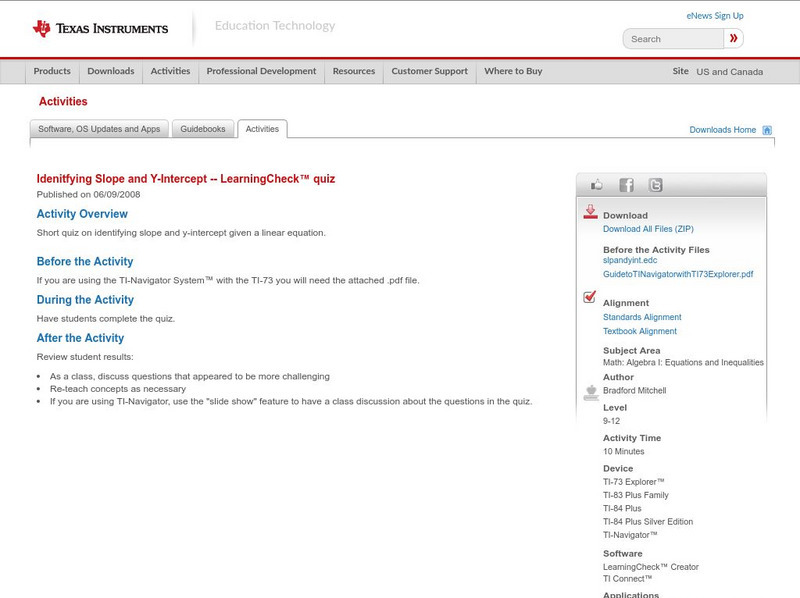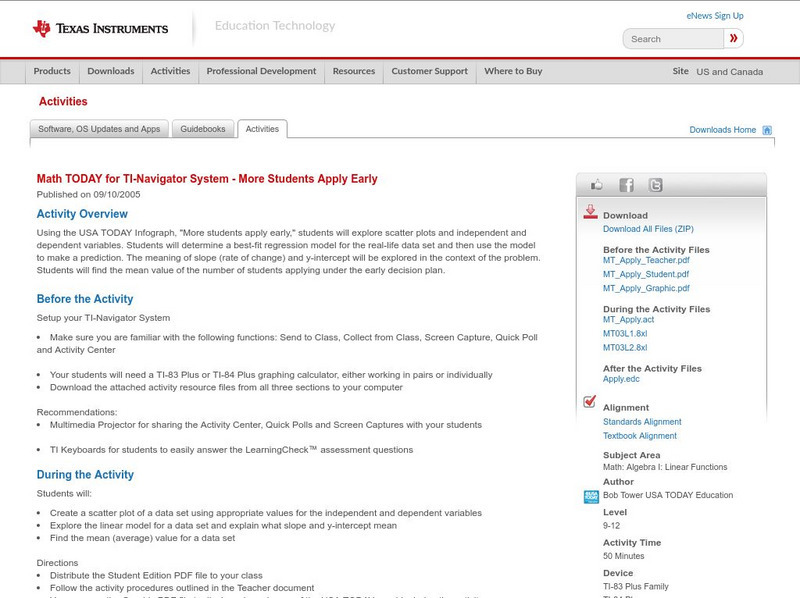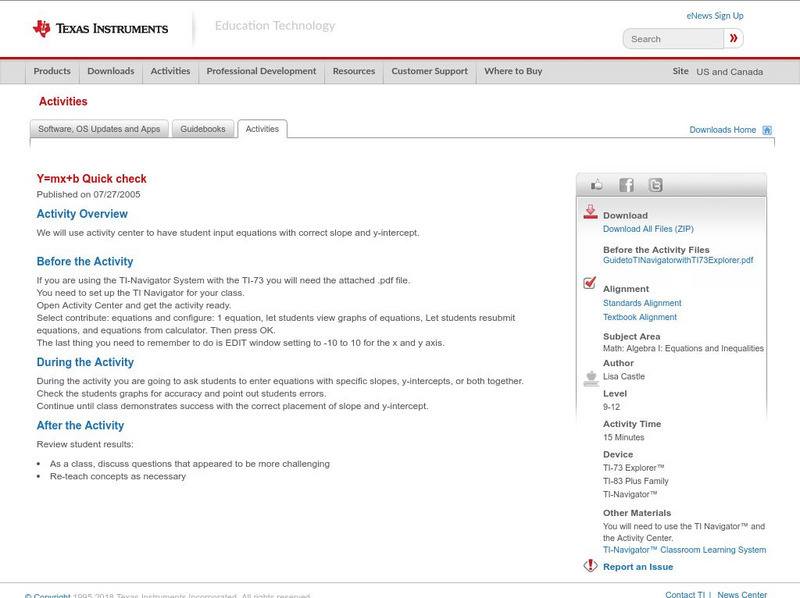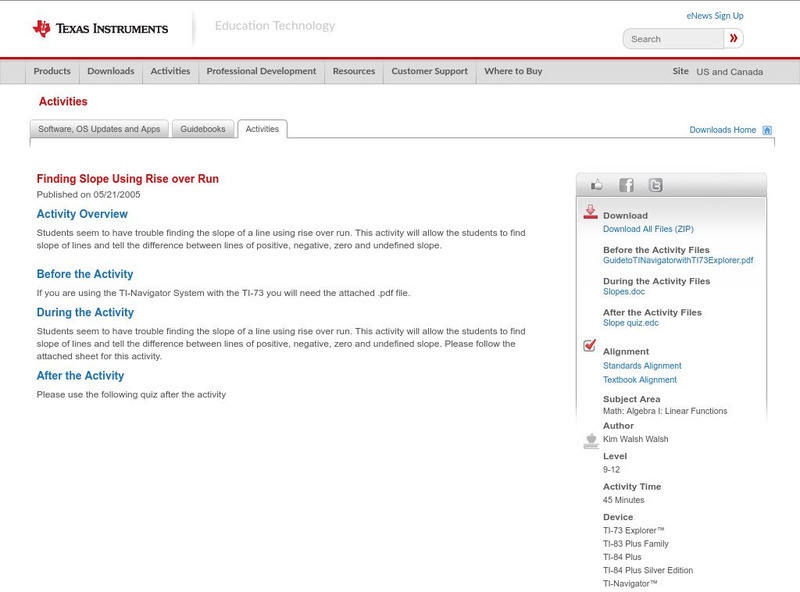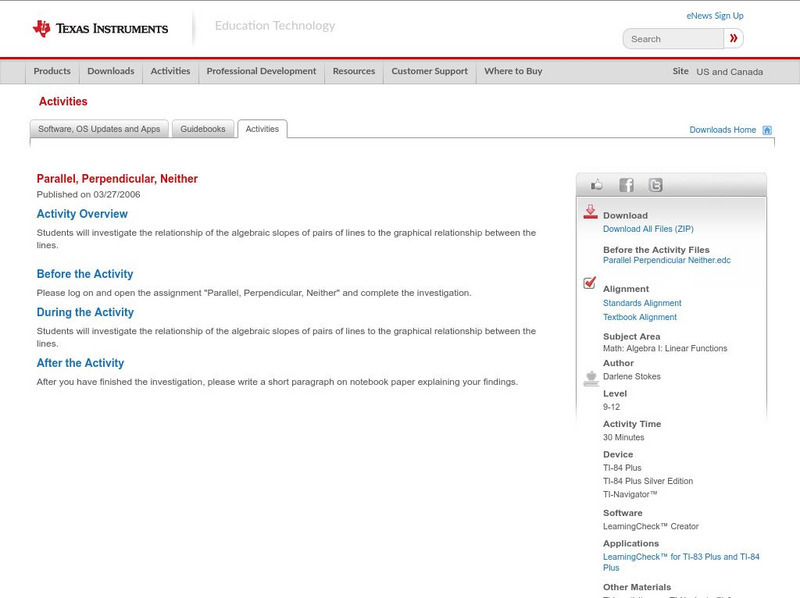Texas Instruments
Texas Instruments: Home for the Holidays
Thanksgiving Holiday activity for Algebra students. Linear data taken from the internet and used to create a linear model of the class data.Students will then discover the slope of the line is the speed of the car in miles per hour....
Texas Instruments
Texas Instruments: Idenitfying Slope and Y Intercept
Short quiz on identifying slope and y-intercept given a linear equation.
Texas Instruments
Texas Instruments: Slopes and Y Intercepts With Cabri Jr.
Use the TI-84 Plus, Cabri Jr., and TI-Navigator to teach slopes and y-intercepts in your Algebra classroom.
Texas Instruments
Texas Instruments: Math Today for Ti Navigator System: More Students Apply Early
Using the USA TODAY Infograph, "More students apply early," students will explore scatter plots and independent and dependent variables. Students will determine a best-fit regression model for the real-life data set and then use the...
Texas Instruments
Texas Instruments: Polynomial Addition, Subtraction
This StudyCard stack teaches that, when linear functions are added, the slope of the sum is equal to the sum of the slopes, likewise for y-intercepts. Includes quadratic and up polynomials.
Texas Instruments
Texas Instruments: Lines in the Plane
In this activity, students create a slope triangle and understand the concepts of slope and the equation of lines. They realize that slope is constant at all points along a fixed line. They also explore the slopes of parallel and...
Texas Instruments
Texas Instruments: Buried Objects Adventure 1
Students use the CBR 2 to gather data and identify "buried" objects. They interpret and analyze graphs of height as a function of time, and use the change in the y-coordinates of an ordered pair to determine the height of an object.
Texas Instruments
Texas Instruments: Getting Started With the Ti Navigator: What's My Line
This lesson introduces students to Activity Center and is intended to help students understand the meaning of slope and y-intercept. They will explore the relationships between symbolic expressions and graphs of lines by using Activity...
Texas Instruments
Texas Instruments: Inverse of Two Temps
In this activity, students find a conversion equation that will calculate the corresponding Celsius temperature for any given Fahrenheit temperature. Students learn to graph scatter plots, analyze and graph linear equations, compute and...
Texas Instruments
Texas Instruments: Y=mx+b Quick Check
In this activity students use an activity center to input equations with correct slope and y-intercept.
Texas Instruments
Texas Instruments: Linear Relationship Between Weight and Quality
Students use a Force Sensor to collect weight versus number data for a collection of identical pennies and model the data using a linear equation. They will then interpret the slope as it relates to independent and dependent variables.
Texas Instruments
Texas Instruments: Finding Slope Using Rise Over Run
Students seem to have trouble finding the slope of a line using rise over run. This activity will allow the students to find slope of lines and tell the difference between lines of positive, negative, zero and undefined slope.
Texas Instruments
Texas Instruments: Investigating Properties of Lines in the Plane
In this activity, students draw a line and determine its slope. They understand that the slope of a line is actually the ratio of rise over run.
Texas Instruments
Texas Instruments: Parallel, Perpendicular, Neither
Students will investigate the relationship of the algebraic slopes of pairs of lines to the graphical relationship between the lines.
Texas Instruments
Texas Instruments: Exploring Slope: Slope on the Slopes
Students take a field trip to a local ski area(or simply a nearby hill) and calculate the slope of a hill at several positions.
Texas Instruments
Texas Instruments: Step Up
Students learn to use measurements on a real model to develop the concept of slope and linear functions. They use a calculator to explore changing the slopes and Y- intercepts in the slope intercept form Y = MX + B.
Texas Instruments
Texas Instruments: Exploring Slope Intercept Form of a Line
Use TI-Navigator to explore the relationship between a linear function and its graphs. See how the value of the slope and y-intercept affect the graphs.
Science Education Resource Center at Carleton College
Serc: Natural Stream Tables
This multi-part lesson serves as an introduction to stream tables. Students will develop a stream table outside using items they find in the park that represent what they think will and will not get washed into the St Louis River.
Science Education Resource Center at Carleton College
Serc: Investigating Speed and Constant Acceleration
Students roll miniature cars down a ramp and measure their speed and acceleration every 10 cm. Students can vary the type of car, height of ramp or the ramp material. Student change one of these variables to investigate how the car's...
Science Education Resource Center at Carleton College
Serc: Rain Erosion: Does the Rate of Water Effect Erosion?
In this lab, students investigate whether the rate of water falling (rain) affects the amount of erosion (soil movement). This experiment could lead to further questions: how does grass or rocks effect soil erosion, does erosion lead to...
Texas A&M University
Wtamu Virtual Math Lab: College Algebra: Slope of a Line
Through this tutorial, you'll know what slope is and how to determine it. View examples of positive, negative, zero, and undefined slope, follow step-by-step slope calculations, and complete practice problems at the end.
Texas A&M University
Wtamu Virtual Math Lab: College Algebra: Graphing Lines
Complete this tutorial to learn how to graph a straight line if given the y-intercept and slope and how to graph horizontal and vertical lines. View examples of lines with different slopes, and practice working with slope-intercept form.
Texas A&M University
Wtamu Virtual Math Lab: College Algebra: Parallel and Perpendicular Lines
Given a line, learn how to find the equations for lines that are perpendicular and parallel to it. This tutorial offers several example graphs and problems as well as practice problems for you to work through when you're ready.
Northeast Parallel Architectures Center, Syracuse University
Npac Reu Program: Slope
This Northeast Parallel Architecture Program, Syracuse University site explains and illustrates by using the changes in the values of x and y you can determine the slope of a line.



